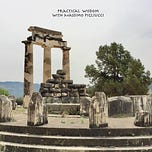“Of the non-rational [component of the soul], one part seems to be that which is held in common and vegetative—I mean that which causes nutrition and growth. For someone could posit that such a capacity of the soul is in all things that are nourished. …
A certain virtue belonging to this capacity, then, appears to be common and not distinctive of a human being. …
Yet there seems to be also a certain other nature of the soul that is non-rational, although it does share in reason in a way. For in the case of the self-restrained person and of the one lacking self-restraint, we praise their reason and that part of their soul possessing reason, since it correctly exhorts them toward the best things. But there appears to be something else in them that is by nature contrary to reason, which does battle with and strains against reason. …
It appears, therefore, that the non-rational part is twofold, for the vegetative part has nothing in common with reason; but that part characterized by desire, and by longing in general, shares somehow in reason inasmuch as it heeds it and is apt to be obedient to its commands.”
(Nicomachean Ethics, I.13)
Listen to this episode with a 7-day free trial
Subscribe to The Philosophy Garden: Stoicism and Beyond to listen to this post and get 7 days of free access to the full post archives.












